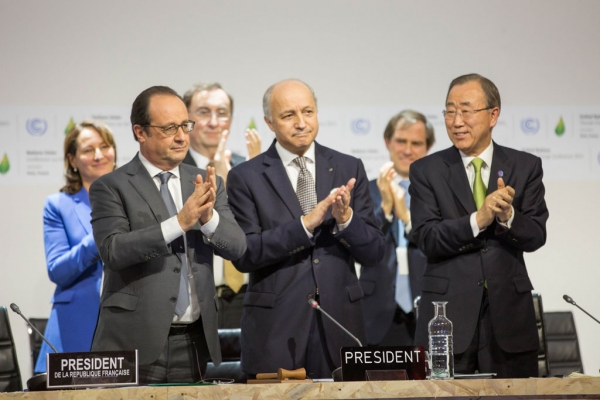Laurent Fabius Sums Up Paris Agreement Strengths and Key Objectives for 2016

"One remarkable feature of the Paris outcome is that all Parties can identify with it, and call it their own. This sense of collective ownership was made possible by the tremendous work achieved under the Durban platform for several years, the informal meetings held throughout 2015, and the intensive bilateral engagement of all Parties. Paris has shown that the UNFCCC process could deliver, as long as it was fuelled by transparency, trust, and strong political will. In that regard, it was not only a victory for our climate, but also for multilateralism as a whole.
Some commentators have been kind enough to attribute this victory to the tireless efforts of French diplomacy and myself. I could be tempted to accept this explanation, though it would go against our famous reputation for modesty. In reality, I think our role limited itself to translating, in diplomatic terms, a unique alignment of the planets. The impacts of climate disruption had never been felt so strongly around the world - 2015 was a record year; climate science had never been so clear and consensual; the prospects of low-carbon, resilient development had never looked so promising; commitment to climate action, through the INDCs, the LPAA and the NAZCA platform, had never reached such a universal scale. And the political will of leaders and spirit of compromise made the difference to the final outcome, and through it made a profound difference for the world.
The Paris agreement represents indeed, in my view, the most balanced, comprehensive and ambitious result that we could hope to achieve. Its long-term objectives set the bar very high in terms of ambition, be it on temperature rise limits, emissions trajectory, resilience or the shifting of financial flows. The INDC and stock-taking process should be dynamic enough to enable Parties to reach these objectives over time. It is also a fair agreement: it reflects responsibilities as well as economic realities between countries, while recognizing that they can evolve over time; and it makes sure that no country is left behind.
After this considerable negotiation effort, our collective focus must move to implementation. We now have an obligation to live up to the ambition shown in Paris, and even exceed it if possible. There is a lot of work ahead of us. At a national level, each of us needs to prepare to implement the INDCs that we transmitted last year – that does not just mean transforming them into NDCs, but turning them into actual public policies and programmes that we can implement and finance. Many developing countries may need assistance to make such steps, means of implementation will play an important role in the implementation of some of those policies, with capacity building being in this period a critical part of actions to accompany such policy development.
Within the Convention we also have a heavy agenda: signing and ratifying the agreement, so that it can come into force as soon as possible; preparing the implementing decisions of the agreement; maximizing pre-2020 action by all; and demonstrating, in Marrakech, that we have truly entered a new era of global cooperation of climate change. We cannot give the impression that Paris was an accident, and return to negotiations-as-usual. France and Morocco will work hand-in-hand to ensure that this is not the case and we count on the chairs of the subsidiary bodies, the chairs of the new APA and of the constituted bodies to help us all in that respect.
I would mention one other aspect: the sectors that are not covered by the Paris agreement. I am thinking, in particular, about HFCs, as well as air and maritime transport. The negotiations ahead in the competent structures will not be easy, but COP 21 showed that even the most difficult multilateral negotiations could reach a successful conclusion. Progress on these sectors should at least meet, and if possible exceed, the ambition of the Paris agreement."
Note on the Bureau: Traditionally, the Bureau is responsible for advising the President and taking decisions with regard to the overall management of the intergovernmental climate change process. The Bureau has overall responsibility for questions of process. Bureau members often consult with their regional groups on issues. The Bureau is not a forum for political negotiations. It is elected from representatives of Parties nominated by each of the five United Nations regional groups and small island developing States.

Facebook comments